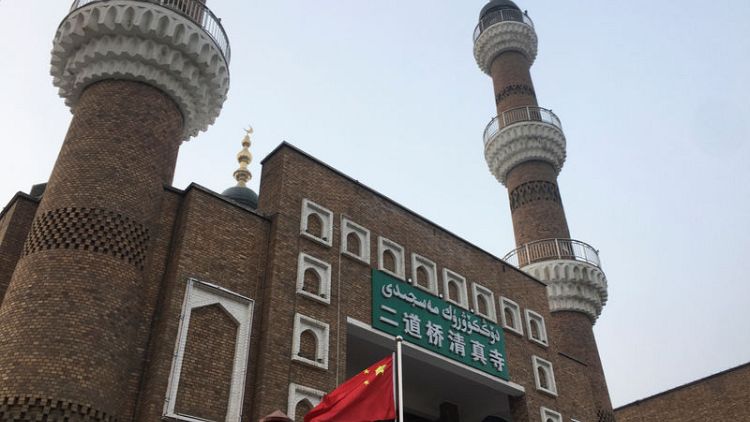By Ben Blanchard and Robin Emmott
BEIJING/BRUSSELS (Reuters) - China will invite Beijing-based European diplomats to visit its far western region of Xinjiang, the foreign ministry told Reuters, furthering its outreach to fend off criticism about a de-radicalisation programme.
The visit would be the first by a large group of Western diplomats to the region as China faces growing opprobrium from Western capitals and rights groups for setting up facilities that U.N. experts describe as detention centres holding more than one million ethnic Uighurs and other Muslims.
Several diplomatic sources said the invitation to visit by the end of March had been issued informally, specifically to ambassadors, with one source describing it as a "sounding out" of interest, and the government had not explicitly said who they would meet or where they would go.
It is also not clear if the Europeans would accept the invitation, or how many of their diplomats or ambassadors would go.
Last year, more than a dozen ambassadors from Western countries, including France, Britain, Germany and the EU's envoy in Beijing, wrote to the government to seek a meeting with Xinjiang's top official, Communist Party chief Chen Quanguo, to discuss their concerns about the rights situation.
Diplomats say the government never responded to that letter, aside from publicly denouncing it as a violation of diplomatic norms.
It was not clear if a meeting with Chen would be on the agenda.
"In order to increase the European side's understanding of Xinjiang's achievements at economic and social development, and promote bilateral exchanges and cooperation, China plans in the near term to invite European envoys based in China to visit Xinjiang," the foreign ministry said in a statement to Reuters.
The date and other details were still being worked it, the ministry added.
"Hearing something for a hundred times is not as good as seeing it for yourself," the ministry's statement said.
The European Union's mission in Beijing declined to comment.
Chinese President Xi Jinping travels to Europe on Thursday for a state visit to Italy, Monaco and France.
'HAPPY LIVES'
Beijing has been ramping up its efforts in defence of its measures in Xinjiang, which it says are aimed at stemming the threat of Islamist militancy. It calls the camps vocational training centres.
China "believes that through this trip, European envoys based in China will be able to personally experience the real situation of Xinjiang's calm, order and peace and the happy lives of all its people", the ministry said.
Last week, the U.S. State Department said China's treatment of Muslims in Xinjiang marked the worst human rights abuses "since the 1930s".
The administration of U.S. President Donald Trump has weighed sanctions against senior Chinese officials in Xinjiang, including Chen.
Some diplomats briefed on the situation said there was concern the European diplomats could be used for propaganda purposes, pointing to pictures taken by and stories in state media about recent visits by other foreign envoys to Xinjiang.
"There's no point in going if we're just going to be portrayed as supporting the camps," said one diplomat.
EU foreign ministers raised the issue of the Uighurs with the government's top diplomat, State Councillor Wang Yi, on Monday at a lunch in Brussels, sources told Reuters.
While Wang was keen to focus on a list of issues of cooperation and agreement, EU ministers underlined the issue of human rights and the Uighurs, asking for explanations about why the people were being held and on reports of crackdowns on Muslims, sources said.
One EU diplomat said Wang's reply was "not satisfactory".
Wang said China was a big country with a lot of people so it could not be avoided that some individuals complain about treatment, and China was a developing country and measures were not against Uighurs but against extremists, the diplomat said.
"He was puzzled about why we are worried about it," the diplomat said.
The foreign ministry did not immediately respond to a request for comment on Wang's Xinjiang discussions in Brussels.
Premier Li Keqiang will visit Brussels next month for a China-EU summit.
There have been two visits by groups including European diplomats to Xinjiang this year. One was a small group of EU diplomats, and the other by a group of diplomats from several countries, including EU members Hungary and Greece.
There have also been at least two other trips to Xinjiang for foreign diplomats.
A diplomat who has been on a government-organised trip to Xinjiang, said during the entire programme reporters from state media accompanied them, taking pictures and trying to interview the envoys.
"It was impossible to avoid them," the diplomat said.
There is also concern that the European envoys would be taken to the same camps and sites that previous foreign visitors have been taken to on tightly controlled and carefully choreographed trips, including one Reuters went on in January, the sources said.
"There's no point in going just to see the same places," said another diplomat familiar with the invitation.
All the diplomats spoke on condition of anonymity.
China's diplomatic efforts have included a briefing in Beijing late last month, where two former camp inmates spoke in front of envoys to describe how they had been rescued from radical Islam, people who attended the briefing told Reuters.
China has strongly defended the camps.
Xinjiang governor Shohrat Zakir told reporters in Beijing last week the facilities were "boarding schools" and not concentration camps.
Beijing says it must tackle radical Islam in Xinjiang, where hundreds have been killed in violence in recent years blamed by the government on militants and separatists.
Reuters last year reported on conditions inside the camps and took pictures of guard towers and barbed wire surrounding some. (https://tinyurl.com/y9zzouss)
(Reporting by Ben Blanchard, Robin Emmott; Editing by Robert Birsel)


